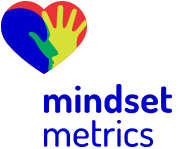This high granularity is fine for applicant screening and pre-hire assessments. Many of these take thirty minutes to an hour for completion. That is not the intended use for Mindset Data. This is a Mindset preference survey, two minutes in length, which harvests one’s overall preferences across a spectrum of possibilities. The Mindset Data survey asks the clear end-points of what is typically asked repeatedly in long-form assessments. It is not intended to compete with long form assessments, but rather be an on-going complement to them. It is compatible with all existing DISC and Motivators models in the marketplace and can be used as a low-cost addition to amplify the results.




